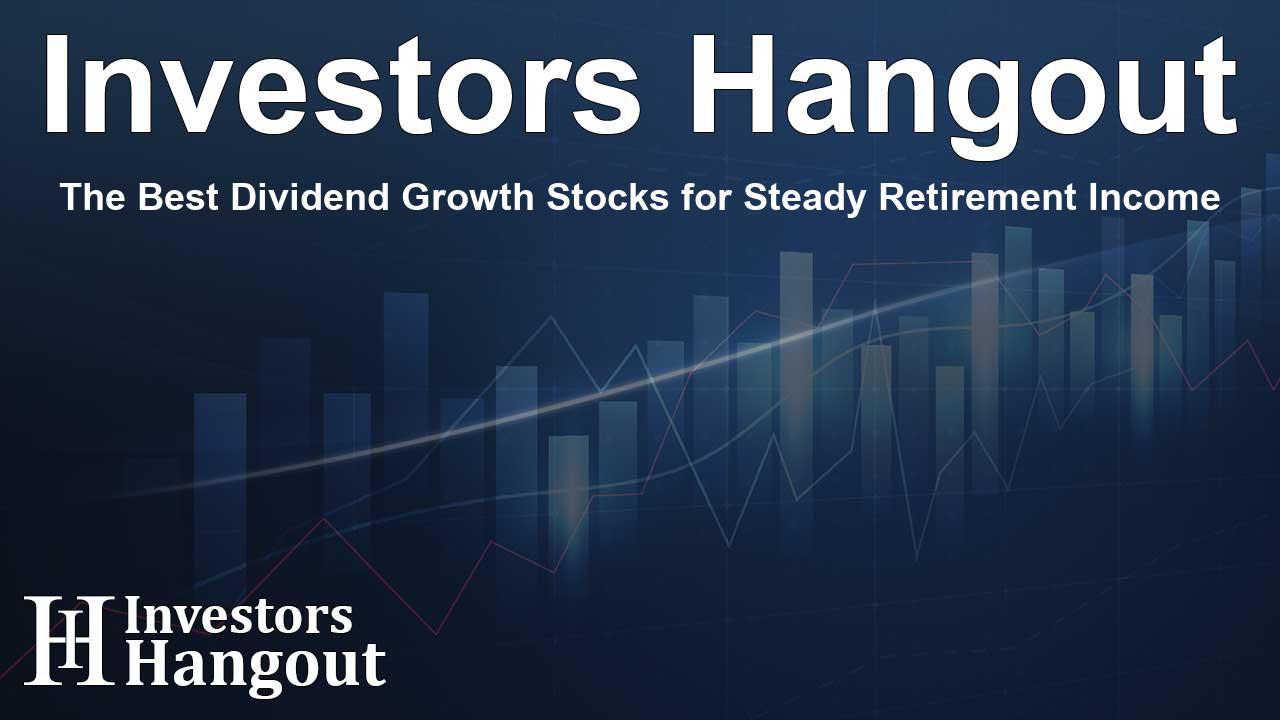The Best Dividend Growth Stocks for Steady Retirement Income

Understanding Passive Income for Retirement
Achieving a reliable income stream in retirement is essential, especially considering the uncertainties surrounding government benefits. Many individuals are increasingly aware that building alternative sources of income is crucial for long-term financial health.
Dividend stocks have emerged as a popular choice among retirees looking for stable income. When it comes to selecting the right stocks, not all dividend-paying companies are equal. Recognizing the key characteristics of strong dividend stocks can aid investors in making informed decisions.
Key Characteristics of Strong Dividend Stocks
The best dividend-paying stocks often exhibit three fundamental traits: a payout ratio below 50%, dividend growth rates over 6%, and capital appreciation that matches or exceeds the overall market's. These factors indicate robust businesses capable of generating reliable and growing income streams, ideal for retirement planning.
1. Lowe's: The Home Improvement Leader
Lowe's Companies (NYSE: LOW) stands at the forefront of the home improvement sector. With over 1,700 locations in North America, it's a go-to for both DIY enthusiasts and professional builders. The company's strong reputation and consistent demand for home improvement products and services serve as significant advantages.
Lowe’s impressive 15.2% dividend growth rate over the past decade is among the highest in its class. Coupled with a conservative payout ratio of 36.7%, it provides a robust safety net for income-seeking investors, ensuring dividends can be sustained even during economic fluctuations.
This safety margin helps protect against potential dividend cuts, allowing investors to enjoy the benefits of compounding over time. Over the last ten years, Lowe's has reduced its outstanding shares by 41%, enhancing per-share earnings and driving further dividend growth.
2. Lockheed Martin: Aerospace Stability
Lockheed Martin (NYSE: LMT) represents a solid investment in the aerospace and defense industry. Well-known for its advanced technology in military and space applications, the company routinely secures long-term government contracts, providing a steady revenue base.
Lockheed Martin has posted an impressive 7.7% dividend growth rate over the last decade. Its payout ratio stands at a healthy 45.1%, offering assurance to income investors that dividends are unlikely to face cuts or suspensions even during challenging economic climates.
With a commitment to returning value to its shareholders, Lockheed has decreased its share count by 22% over the last ten years, boosting earnings per share and subsequently its dividend growth rate. Its forward P/E ratio of 19.9 allows for an attractive entry point compared to market averages.
3. Target: Retail Powerhouse with Strong Dividends
Target (NYSE: TGT) is a leading retail chain recognized for its diverse product offerings including clothing, electronics, and groceries. The company's focus on customer experience and competitive pricing ensures continuous demand.
With a remarkable 10% dividend growth rate across the last ten years and a payout ratio of 45.4%, Target offers security for income-oriented investors. Even amid potential market challenges, the retailer's comprehensive growth strategy minimizes the risk of dividend cuts.
Furthermore, Target’s share reduction of 27.7% over the past decade has provided additional value to shareholders by propping up earnings per share and supporting aggressive dividend growth. Its forward P/E ratio of 16.3 highlights its attractiveness in the retail sector.
Building a Robust Passive Income Portfolio
Investing in dividend growth stocks like Lowe's, Lockheed Martin, and Target can help cultivate a viable passive income portfolio. Each company not only offers attractive current income but also shows promise for sustainable long-term growth and above-average returns. Notably, all three stocks have outperformed the S&P 500 over a 10-year period, highlighting the effectiveness of dividend growth strategies.
Frequently Asked Questions
What are dividend growth stocks?
Dividend growth stocks are shares in companies that consistently increase their dividend payouts, providing a steady income stream for investors.
Why are dividend stocks important for retirees?
They offer a reliable income source to supplement retirement savings, especially in light of unpredictable government benefits.
How can I identify strong dividend growth stocks?
Look for companies with low payout ratios, high dividend growth rates, and strong capital appreciation
Are there risks associated with investing in dividend stocks?
Yes, market fluctuations and business challenges can impact dividend payouts; however, companies with solid fundamentals typically offer more stability.
How often do companies pay dividends?
Dividends can be paid quarterly, semi-annually, or annually, varying based on the company's policy.
About Investors Hangout
Investors Hangout is a leading online stock forum for financial discussion and learning, offering a wide range of free tools and resources. It draws in traders of all levels, who exchange market knowledge, investigate trading tactics, and keep an eye on industry developments in real time. Featuring financial articles, stock message boards, quotes, charts, company profiles, and live news updates. Through cooperative learning and a wealth of informational resources, it helps users from novices creating their first portfolios to experts honing their techniques. Join Investors Hangout today: https://investorshangout.com/
Disclaimer: The content of this article is solely for general informational purposes only; it does not represent legal, financial, or investment advice. Investors Hangout does not offer financial advice; the author is not a licensed financial advisor. Consult a qualified advisor before making any financial or investment decisions based on this article. The author's interpretation of publicly available data shapes the opinions presented here; as a result, they should not be taken as advice to purchase, sell, or hold any securities mentioned or any other investments. The author does not guarantee the accuracy, completeness, or timeliness of any material, providing it "as is." Information and market conditions may change; past performance is not indicative of future outcomes. If any of the material offered here is inaccurate, please contact us for corrections.